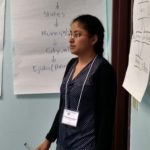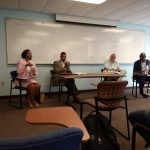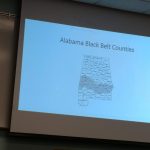Written by: Donna Davis, University of Missouri
 The 15th Annual International Comparative Rural Policy Studies (ICRPS) Summer Institute has started and everyone would agree hosted by a very accommodating, gracious, and friendly Tuskegee University faculty and campus student body. The theme this year ‘Social Justice, Rural and Natural Resource Policy’ follows ICRPS with the focus as identified in the syllabus on the policies and programs affecting small-scale, beginning minority and indigenous farmers, landowners and their communities.
The 15th Annual International Comparative Rural Policy Studies (ICRPS) Summer Institute has started and everyone would agree hosted by a very accommodating, gracious, and friendly Tuskegee University faculty and campus student body. The theme this year ‘Social Justice, Rural and Natural Resource Policy’ follows ICRPS with the focus as identified in the syllabus on the policies and programs affecting small-scale, beginning minority and indigenous farmers, landowners and their communities.
 After welcomes by Thierno Thiam and Robert Zabawa, and introductions by the more than 20 students, we jumped into a lively engagement moderated by Judy Stallmann, University of Missouri, with government structure sharing from the students representing the various countries including Canada, Ghana, Nepal, Bangladesh, Nigeria, Jamaica, Trinidad & Tobago, France, Spain, Mexico, the United States, and others.
After welcomes by Thierno Thiam and Robert Zabawa, and introductions by the more than 20 students, we jumped into a lively engagement moderated by Judy Stallmann, University of Missouri, with government structure sharing from the students representing the various countries including Canada, Ghana, Nepal, Bangladesh, Nigeria, Jamaica, Trinidad & Tobago, France, Spain, Mexico, the United States, and others.
Thierno Thiam than introduced a 3-person guest speaker panel from local and state of Alabama governments Lawrence ‘Tony’ Haygood, Mayor of the City of Tuskegee; Andrew Thompson, Commissioner in Macon County, and Anita Archie, Alabama Department of Economic and Community Affairs.
 Ray Bollman, Brandon University and Robert Zabawa, Tuskegee University, opened presentations on ‘What is Rural?’ – including definitions of rural and rurality, rural policy, rural development, and rural indicators; introduced the Southern Black Belt counties in Alabama; and ended with the questions – Where does RURAL fit into the cause and effect equation? Is it a CAUSE? Or an OUTCOME? – Or does it matter? (Yes! – author note!).
Ray Bollman, Brandon University and Robert Zabawa, Tuskegee University, opened presentations on ‘What is Rural?’ – including definitions of rural and rurality, rural policy, rural development, and rural indicators; introduced the Southern Black Belt counties in Alabama; and ended with the questions – Where does RURAL fit into the cause and effect equation? Is it a CAUSE? Or an OUTCOME? – Or does it matter? (Yes! – author note!).
 Country Examples of ‘What is Rural? were presented by Gabino Nava-Bernal, Universidad Autonoma del Estado de México for Mexico, Wayne Kelly for Canada, and Philomena De Lima for Scotland.
Country Examples of ‘What is Rural? were presented by Gabino Nava-Bernal, Universidad Autonoma del Estado de México for Mexico, Wayne Kelly for Canada, and Philomena De Lima for Scotland.
 A great special Tuskegee Achieves tour was given by Dana Chandler, Tuskegee University, with special kudos for Cheryl.
A great special Tuskegee Achieves tour was given by Dana Chandler, Tuskegee University, with special kudos for Cheryl.
What a great Day 1 completed with an afternoon rain shower!
(If needed, submitted by Donna Davis, University of Missouri)

